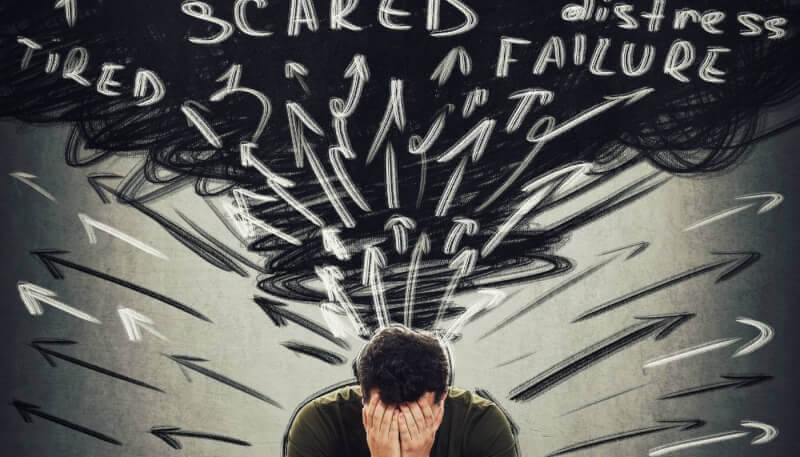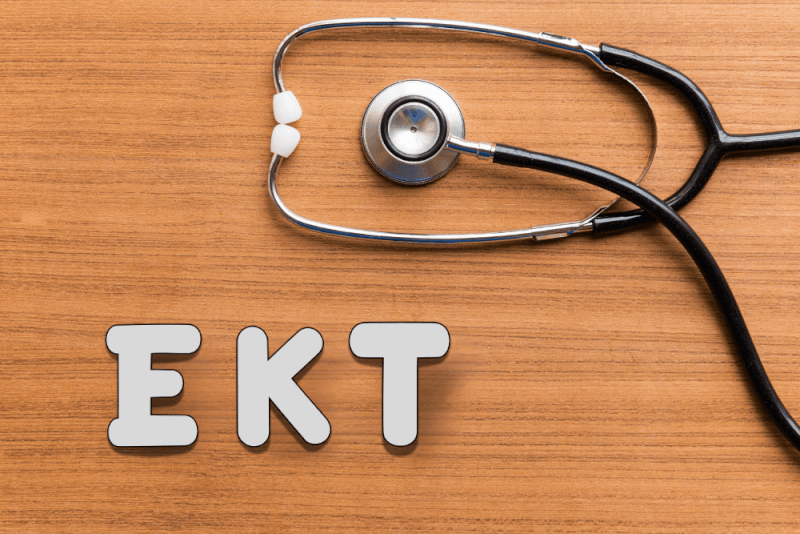30 Second Summary
- Anxiety is an excessive and uncontrollable experience of feelings such as worry, anxiety and fear.
- It is a common disease in the community.
- The exact causes are unknown, but genetic, environmental, psychological and medical factors may play a role.
- It can be treated with psychotherapy and medication.
What is Anxiety?
Anxiety disorder, also called anxiety disorder, affects approximately 18% of the population. Anxiety is an anxiety that people face in their daily lives. It prepares the brain to deal with problems, and sets the stage for faster decision-making. Anxiety is the way people's brains warn them of future dangers. It is normal for people to experience anxiety during the day. But people with anxiety disorders always think the worst and cannot control their thoughts. Because of these thoughts, people's daily and social lives may be disrupted. In addition, patients' mental health deteriorates. When all this comes together, anxiety disorder seriously reduces the quality of life of people.
Types of Anxiety
Anxiety disorders are divided into several subtypes.
Generalized Anxiety Disorder
Generalized anxiety disorder is basically when patients experience a wide range of anxiety disorders, not for specific things but for influences in all areas of their lives. With this state of extreme anxiety, patients have difficulty going about their daily lives. Their concerns are particularly centered on family, health and money. In addition to these concerns, patients think that what happens to them is uncontrollable and irreversible. The likelihood of generalized anxiety disorder persisting throughout life varies between 5% and 6%.
Obsessive-Compulsive Disorder
OCD patients are both self-compulsive and obsessive. For this reason, they are extremely easy to recognize. OCD sufferers have certain rituals to control their anxiety when it rises. But these rituals do not have a realistic relationship with the causes of their anxiety.
Panic Disorder
Patients diagnosed with panic disorder experience panic attacks with intense and sudden fears. During a panic attack, patients may experience chest pains, an accelerated heartbeat and sweating. During a panic attack, patients may feel like they are having a heart attack or suffocating.
Phobias
Patients may develop extreme fear of certain stimuli. These fears are far above the normal level and the reason for fear need not be realistic. The most well-known phobias include fear of heights, fear of spiders, fear of separation and fear of open spaces. Some phobias can also be defined as a sub-branch of anxiety disorders.
Post Traumatic Stress Disorder
Trauma is when people experience events that make them feel helpless and have no influence on the events, as well as excessive odor. Natural disasters, war or sexual assault are examples of trauma. The mental breakdown that people experience after these traumas is called post-traumatic stress disorder.
Social Anxiety Disorder
Patients with social anxiety disorders have a serious fear of being criticized in social situations. These fears cause them to withdraw from social situations.
What are the Symptoms of Anxiety?
While there are many subtypes of anxiety disorder, there are some common symptoms. These symptoms are the following:
Physical Symptoms
Physical symptoms of anxiety include the following:
- Difficulty breathing,
- Palpitations
- Abdominal pain
- Stomach cramps
- Pain in the jaw and neck muscles,
- Excessive sweating,
- Headache
- Fatigue
- Nausea
- Dry mouth
- Shortness of breath
- Dizziness
- Numbness in the hands and feet,
- Sweating of the hands and feet,
Mental Symptoms
The psychological symptoms of anxiety disorder are as follows:
- Sleep problems
- Not being able to stay calm,
- Mood swings,
- Feeling anxious all the time,
- Panic,
- Fear
- Restlessness,
Causes of Anxiety
The factors that cause anxiety disorders have not been fully identified. However, some studies have found some factors that increase the risk of anxiety disorders. These factors can be listed as follows:
- Genetic factors,
- Faulty wiring of the center in the brain responsible for controlling fear and emotions,
- Environmental traumas,
- Lung, heart, diabetes and thyroid health problems,
- Side effects of the medicines used,
In addition to these, there are some factors that increase the risk of anxiety disorder. Neglect or sexual abuse in childhood is one of the factors that increase the risk of anxiety. In addition, people who have experienced traumatic events at some point in their lives are more likely to experience anxiety disorders.
Another factor that increases the risk of anxiety disorders is depression. It is also known that constant worry and stress about one's own health or that of a loved one can increase anxiety disorders.
Factors such as drug use or alcohol abuse also increase the risk of anxiety.
Not talking to strangers from childhood also increases the likelihood of having an anxiety disorder. In addition, people who lack self-confidence and feel that people are constantly making fun of them are more likely to suffer from anxiety disorders. In addition, certain personality types are more likely to suffer from anxiety disorders.
How is anxiety diagnosed?
Both physical examination and patient history are used in the diagnosis of anxiety disorders. Laboratory tests are performed to identify disorders that may be present in patients and that may be similar to anxiety symptoms. However, these tests are not sufficient for the diagnosis of anxiety, so both these tests and the patients' history and symptoms should be evaluated together.
Anxiety treatment methods
Many different methods are used to treat the symptoms of anxiety disorders. However, the 2 most common forms of treatment are psychotherapy and medication.
Psychotherapy
Psychotherapy, also called talk therapy or psychological counseling, can be defined as working with a counselor to reduce patients' symptoms. Psychotherapies can be used to identify the factors that cause patients' anxiety and work to eliminate these factors.
Cognitive behavioral therapy
With cognitive behavioral therapy, one of the most commonly used forms of psychotherapy for anxiety disorders, counselors help patients learn how to transform their panicky thoughts and behaviors into positive ones. It is one of the most effective methods for patients to understand the anxiety disorders they are experiencing and to learn how to behave when they see them.
Medication
To alleviate the symptoms caused by anxiety, specialists can use various antidepressants and sedatives. The goal of medications used in anxiety disorders is to provide short-term relief to patients. On the other hand, the pros and cons of the drugs used should be shared with the doctor in order to determine the most appropriate drug for the patient.
What to do in times of anxiety?
Both long-term and immediate strategies are needed for people with anxiety to keep symptoms under control. Controlling anxiety in response to real or imagined stimuli perceived by the body is one of the most important steps in improving living conditions.
Skills needed for emergency coping with anxiety attacks
If anxiety attacks are irregular and affect daily life, it is possible to control anxiety attacks with some solutions. Among the things that can be done for this are the following.
Questioning patterns of thinking
Unhelpful thoughts can take root in the minds of people with anxiety disorders. These thoughts cause anxiety attacks to become more frequent. It is therefore necessary to challenge fears. It is also necessary to question the veracity of ideas. In this way, control can be regained.
Focused breathing exercises
Breathing exercises, which are one of the most effective methods for managing momentary anxiety, help to manage emotions. To do this, inhale on the count of four and exhale on the count of four for 5 minutes. This regular breathing helps to slow down the heart rate and thus helps to overcome anxiety attacks in a shorter period of time. There are also other breathing techniques that can be practiced.
Aromatherapy
Research on aromatherapy shows that aromatherapy is effective in reducing anxiety. Although aromatherapists have deeper knowledge in dealing with emotions, sandalwood, lavender and chamomile scents are particularly effective in reducing anxiety.
Exercise
Focusing on the body instead of the mind is the most effective method of eliminating these thoughts, especially when anxious thoughts cannot be coped with. Daily exercise generally increases happiness. In particular, gentle exercise such as yoga and walking are among the best ways to stabilize mood.
Grounding techniques
The most commonly used grounding techniques are logging and applying the 333 rule. Keeping a diary to cope with anxiety and journaling all emotions provides relief. In addition, by reading the diaries afterwards, the underlying causes or triggers of emotions can be understood much more easily.
Rule 333 is the technique of communicating with 3 things that can be seen, heard and touched. Thanks to this technique, worries are relieved in a much shorter time and it is possible to calm down faster.
Long-term ways to cope with anxiety attacks
If anxiety is an important part of life, it is even more important to keep it under control. For this reason, psychiatrists should be contacted to determine the necessary treatment strategies. In addition, there are also the following methods that people with anxiety disorders can apply to control their anxiety in the long term.
Identification of triggers
Identifying the triggers that cause anxiety attacks is one of the most important points for controlling them. People can identify these triggers themselves or seek help from psychiatrists.
Common triggers that cause anxiety attacks include the following:
- Smoking
- Caffeine consumption
- Chronic pain
- Exacerbation of past traumas
- Side effects of some medicines
- Life-related stresses
Therapy
There are many psychotherapies for anxiety disorders. Among these, cognitive behavioral psychotherapies are the most preferred. In these therapies, people are taught to think and react in different ways.
Medication use
In some cases, people with anxiety disorders may need to take medication. However, you should consult a psychiatrist and get advice from him/her before taking these medicines. The use of medication in anxiety disorders is usually common in severe cases. Experts may recommend the use of medication, especially when anxiety affects people's mental health.
The drug groups frequently used in anxiety disorder are as follows.
- Tricyclic antidepressants
- Benzodiazepines
- Serotonin norepinephrine reuptake inhibitors
- Selective serotonin reuptake inhibitors
Meditating
Regular meditation helps to train the brain. It is therefore one of the most important tools for managing anxious thoughts. If it is difficult to sit still, you can try moving meditations such as walking or yoga.
Socializing
Spending regular time with family and friends is another factor that helps people with anxiety attacks to manage their anxiety. The feelings of togetherness, reduced loneliness and laughter experienced through socialization make people more resistant to stress.
Being active
Being distanced from daily life due to anxiety causes anxious thoughts to intensify. For this reason, people need to stay connected to life through activities such as regular exercise or meeting friends.
Diet and supplements
Research on tactics shows that some supplements are effective in managing anxiety in the long term. These supplements include the following:
- Coffee
- Valerian root
- Green tea
- Ashwagandha
- Omega 3
- Melisa
Anxiety crisis
Anxiety attacks occur when anxiety is strong. Anxiety attacks can start suddenly or increase gradually over hours. Among the symptoms seen in people who have an anxiety attack are the following:
- Difficulty focusing
- Weakness
- Tremor
- Rapid heartbeat
- Violent anger
- Restlessness
- Feelings of panic, danger or fear
Some of these symptoms seen in anxiety attacks are similar to panic attacks. However, the two situations are completely different phenomena.







